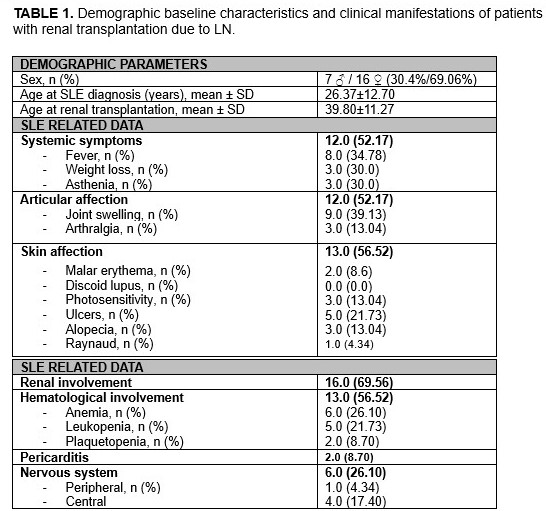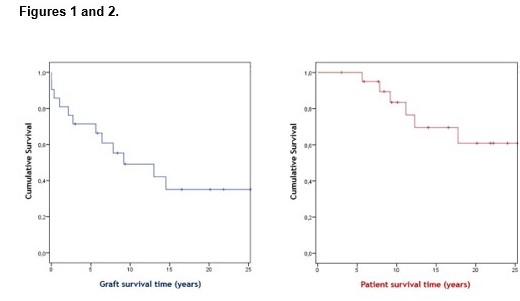Session Information
Date: Monday, November 9, 2020
Title: Miscellaneous Rheumatic & Inflammatory Diseases Poster III: Therapies
Session Type: Poster Session D
Session Time: 9:00AM-11:00AM
Background/Purpose: Lupus nephritis (LN) is a severe complication of systemic lupus erythematosus (SLE). Approximately 10-20% of LN develop end stage renal disease (ESRD) and need replacement therapy. Renal transplantation may be a good option. However, concerns about LN recurrence after renal transplantation have been reported.
In a series of 23 patients with first renal transplantation due to LN our aim was to assess a) clinical features, b) renal transplantation as replacement therapy, c) SLE flares after transplantation.
Methods: Observational study of unselected all consecutive patients studied in a single reference University Hospital with: a) diagnosis of SLE by ACR/SLICC 2012 criteria. b) diagnosis of NL by performing biopsy (according to the World Health Organization and International Society of Nephrology/Renal Pathology Society classification), c) first renal transplant. Cumulative survival rates after transplantation were estimated by the Kaplan-Meier method.
Results: We studied 23 (16 women/7 men) patients with first renal transplantation due to LN; mean age at SLE diagnosis of 26.37±12.70 years and mean age at kidney transplantation of 39.80±11.27 years. Mean follow-up of 12.18±9.02 years. Demographic baseline characteristics and clinical manifestations of these patients are shown in TABLE 1.
The main clinical manifestations at diagnosis were articular (n= 12; 52.17%) and cutaneous (n=13; 56.52%). On the other hand, 16 patients (69.6%) presented impaired renal function at diagnosis. In the other 7 patients (30.4%), this manifestation appeared with a delay of diagnosis from the onset of symptoms of 13.17±7.73 years.
Renal biopsy had been performed in 21 patients with LN: type II LN (n=2; 9.1%), type III (n=8; 36.4%), type IV (n=9; 40.9%) and type V (n=2; 9.1%).
Graft and patients survival function after transplantation is represented in Figure 1 and 2.
Regarding lupus flares after transplantation, 3 patients (13.04 %) developed a lupus flare: 2 cases presented as extrarenal disease (one of them was a pneumonitis and the other one was a cutaneous and articular flare) and only 1 case with histological recurrence in the graft (Mean follow-up 15 ±9.84 years).
Conclusion: Renal transplantation is a safe alternative therapy for ESRD in this population and can provide a long-term survival. However, it is very important to consider the occurrence of flares even in the long-term post-transplant.
To cite this abstract in AMA style:
Sanchez-Bilbao L, De Cos-Gomez M, Gonzalez-Mazon I, Martinez-Lopez D, Ruiz-San Millan J, González-Gay M, Blanco R. Long-Term Follow-Up of Renal Transplantation Due to Lupus Nephritis. Single Universitary Center Experience [abstract]. Arthritis Rheumatol. 2020; 72 (suppl 10). https://acrabstracts.org/abstract/long-term-follow-up-of-renal-transplantation-due-to-lupus-nephritis-single-universitary-center-experience/. Accessed .« Back to ACR Convergence 2020
ACR Meeting Abstracts - https://acrabstracts.org/abstract/long-term-follow-up-of-renal-transplantation-due-to-lupus-nephritis-single-universitary-center-experience/


